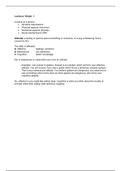Lecture Week 1
A brand as a person:
• All about associations
• Physical aspects (low price)
• Emotional aspects (friendly)
• Brand identity/brand DNA
Attitude: a feeling or opinion about something or someone, or a way of behaving that is
caused by this.
The ABC of attitudes
A: Affective feelings, emotions
B: Behavioural act, behaviour
C: Cognitive belief, knowledge
Out of experience or observation you form an attitude
Example: I am scared of spiders. Scared is an emotion which will form your affective
attitude. You will scream if you see a spider which forms a behaviour towards spiders.
This is your behavioural attitude. You believe spiders are dangerous, you observed or
saw something which forms that you think spiders are dangerous, this forms your
cognitive attitude.
So, affective is you might like eating meat. Cognitive is when you think about the cruelty of
animals which then eating meat becomes negative.
,Lecture week 2
The Self
Identity, beliefs, perception of yourself, image that other people have of you, what you think
of yourself. A combination of all these things form the Self
Because you are who you are, you choose certain products. But also, the products you buy
makes you who you are.
The Self:
• Inner private self and an outer, public self
• Western society:
Focus on uniqueness of each person
• Each single human life is unique > this idea developed between the 11th and 15th
century.
• Eastern cultures:
Focus on collective self, a person derives his or her identity largely from a social
group/ relationship with others.
• Self concept: a complex structure and consists of many attributes
• Refers to the beliefs a person holds about their attributes, and how they evaluate
these qualities
• For instance: overall self concept is positive, certain aspects are evaluated negative
(professional identity vs physical identity)
• In some situations, some aspects of the self are more dominant.
Multiple selves
• Torn-self: torn between two roles
Self concept
A set of perceptions a person has about his/her self
Where does our self concept come from:
From others
• Aka: looking glass self
• Example: a lot of people tell you you’re a good cook, you will now tell this is about
yourself as a quality.
Self observation
• Example: I really like to eat desert, it is not something that people tell me.
• We know our likes and dislikes, it might be influenced by others, but have internalised
these things to our selves over time.
Group associations
• Example: I’m a Christian, I’m a cat person.
Assumed roles
• Examples: wife, mother, owner of business
• These roles are given to you
Upward social comparison
• Example: you see a 10 million dollar home and think to yourself: I wish I could afford
that, what am I doing wrong and what are they doing right? It gives you a goal
Downward social comparison
• See someone who is less fortunate what makes you feel fortunate and grateful
, • Getting an A on a test while no one else got you’re gonna feel really good about that
A.
Real and ideal selves
• Comparing where you are on a certain attribute to an ideal.
• Ideal self: a person’s conception of how they would like to be
• Actual self: our more realistic appraisal of the qualities we have or lack
• Choice for products/services because they fit with our actual self
• Choice for products/services because they help us to get closer to our ideal self
Impression management: work hard to manage what others think of us.
Self-esteem
• Level of positivity of a person’s self concept
• Low self-esteem: expect not to perform well, avoiding situations, etc
• High self-esteem: expect to be successful and like to be in the center of attention
• Brands specifically target specific levels of self esteem.
• Exposure to advertisements: trigger a process of social comparison their self to the
people depicted in the picture.
• Feel better about ourselves when we own products of high aesthetical value
• Female subjects felt badly about themselves after watching thin female models, but
evaluated the brands associated with the model as more positive and when female
subjects saw ads depicting normal weight models they did not feel bad about
themselves but did rate the brands lower.
Self-esteem advertising: stimulating positive feelings about the self. Sometimes by first
making people feel insecure and providing a solution.
You are what you consume
• People see themselves as they imagine how others see them
• Products ( but also the way we eat of which sports we do are visible to others)
• Therefore, these products help to shape the question “who am I?”
Symbolic self-completion theory: people who have an incomplete self-definition tend to
complete this identity by acquiring and displaying symbols associated with it.
Gender
• Gender is important component of one’s self concept
• How should those from a specific gender act, dress, speak and so on
• Training starts very young: female characters in books more likely social roles
• Food: women eat more fruit, men eat more meat. WHY?




